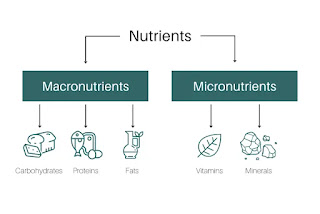Macro and Micro Nutrients
During this week, I
heard somebody asking the purpose of protein in a shake or a smoothie. His
friend confidently answered: “Because is the main nutrient for your body to get
energy”. I answered to myself: “yes and no.” It is a nutrient, but it doesn’t provide
you energy. People have a misconception of nutrients. Not every nutrient
provides energy.
Types of Nutrients
These nutrients are divided into two categories:- ·
Macronutrients,
which are required by the body in large amounts.
- ·
Micronutrients,
which are required by the body in small amounts. Macronutrients
Macronutrients
Macronutrients provide
energy to a living being for the function of the metabolic system. They provide
massive energy as it is converted used to obtain energy. Macronutrients include:
Fats: the main role of
fat is to provide structure and cushion to cells and membranes. Fats help to
prevent damage to the human body by providing cushions. Fats are also crucial
in helping to absorb certain vitamins. Vitamins A, D, E, and K are the only
fat-soluble vitamins. The rest of the vitamins are water-soluble.
Proteins: the main
role of protein is to provide your body with the building blocks to build cells
and other tissues. Protein gets broken down into amino acids which mainly get
used for growth, development, repair, and maintenance of body tissues. Protein
provides structure to muscle and bones. Good sources of protein can be found in
beef, pork, chicken, fish, beans, eggs, dairy products and some vegetables in few
quantities.
Carbohydrates: the main role of carbohydrates is to provide energy and fuel for your body much like gas provides fuel for a car. Carbohydrates are made up of sugars or starches that are bound together. Your body breaks down those carbohydrates mainly into glucose which is the main form your cells use for energy. Carbohydrates are found in fruits, grains, rice, beans, and numerous vegetables.
Micronutrients
Micronutrients provide
essential components for metabolism to be carried out. They also build and
repair damaged tissues in order to control the body process. Micronutrients
include minerals and vitamins.
Minerals and Vitamins:
the main role of vitamins and minerals is to support overall health and play an
important role in cell metabolism and neurological functions. Vitamins help to
aid in energy production, wound healing, bone formation, immunity, and eye and
skin health. Minerals also perform a vast array of functions in the body such
as providing structure to the skeleton, helping to maintain cardiovascular
health, and also to act as cofactors in enzymatic reactions.




Comments
Post a Comment